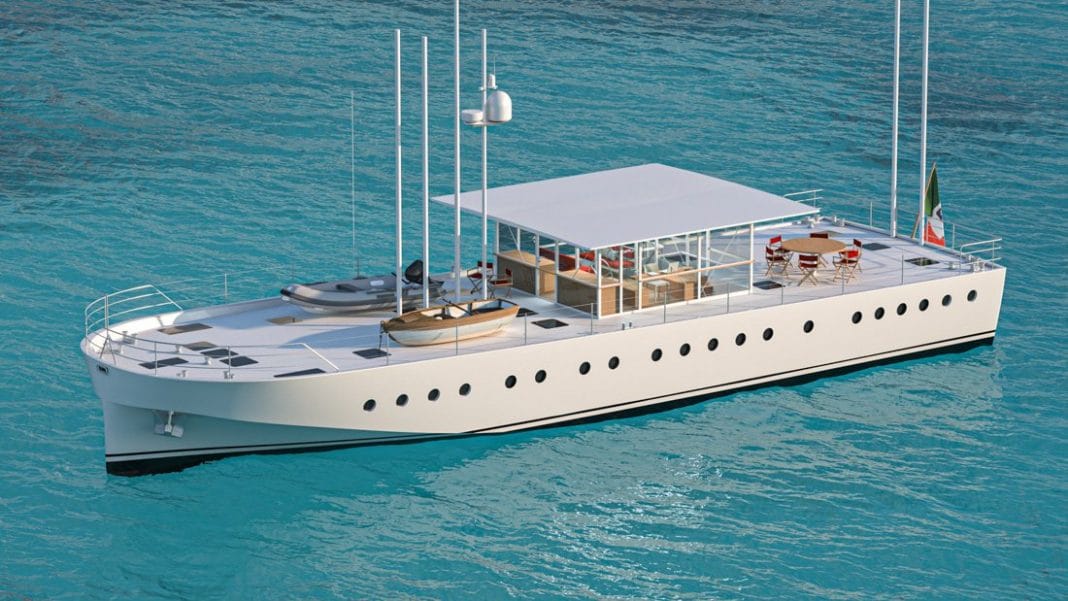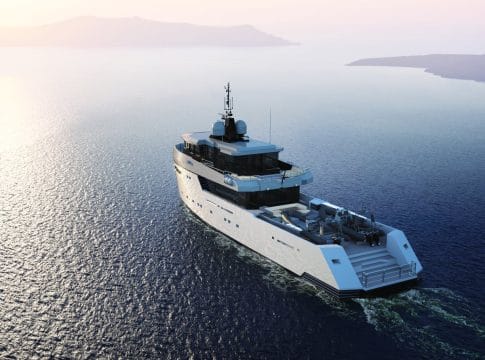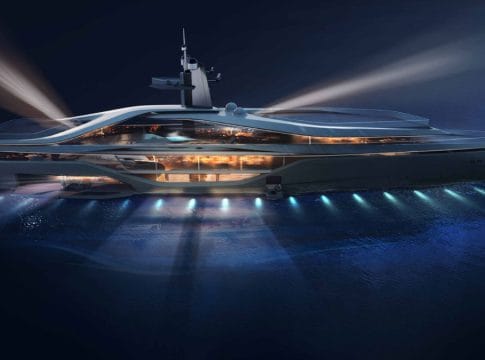The new Zattera 24m that is currently under construction at Castagnola Yacht in Lavagna, Italy began with an idea from Renzo Piano and Olav Selvaag.
Nauta Design and Francesco Rogantin gave shape to that idea and Siemens Energy created its propulsion system.
Inspired by the dream of being able to live life at sea in spiritual silence and in harmony with the natural environment, Zattera, which in Italian means raft, is more a means for enjoying life at sea than a proper yacht. Built in sustainable yet durable wood, its design is pared down and modern with clean and simple hull lines.
Purity and simplicity are the words that best define Zattera’s inspiration. These are achieved through a design that features a raft-like low freeboard and wide beam.
The hull’s clean lines are given extra emphasis by a light and transparent glass superstructure that almost seems to float and that allows for direct, unhindered visual contact between Man and Nature. The feeling aboard is one of lightness, being immersed in Nature, flying free.
Fundamental aspects of the project were increasing serenity to the maximum and reducing noise pollution to a minimum. A vessel that by philosophical choice is made for enjoying the natural soundscape of the sea, moving slowly in Nature and living immersed in peaceful anchorages has to move silently and with reduced fuel consumption. The idea behind Zattera is following the sound of the sea, sailing slowly: the dimension of serenity and peace at sea.
The main choices of the project derive from this idea: first of all its pure and simple look.
Zattera is relatively lightweight with a displacement hull that can navigate at up to 12 knots with a 10,5 knot cruising speed. CFD testing allowed for an optimised bow shape with good sternwards flow and reduced resistance.
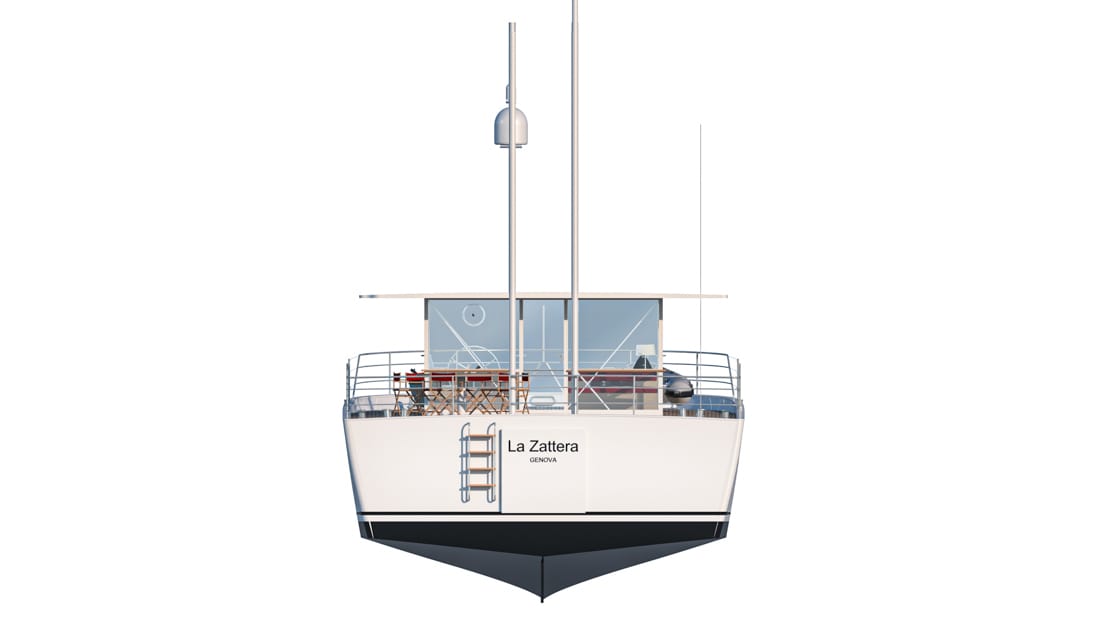
Siemens Energy’s hybrid propulsion system was fundamental in reducing emissions and careful attention was dedicated to eliminating vibration and sound pollution in the surrounding environment. Zattera has lithium-ion batteries and can navigate in silent mode under electric power only.
The propulsion system and the craft’s hotel functions run on two180 kW variable RPM diesel generators and a 95 kWh battery pack connected to a 700 Volt continuous distribution system.
Zattera has a traditional shaft drive run via twin 135kw permanent magnet motors that are directly connected to the shafts without the use of inverters to increase the efficiency of the system, and to further reduce sound and vibration produced by rotation.
The diesel generators were purpose-developed by Mase Generators for Siemens Energy with Volvo Penta D4-300 motors using variable speed technology with permanent magnet alternators in order to minimize consumption and emissions.
The generators are installed on a double anti-vibration pad, an unusual measure that was taken on this vessel and one that underlines its calling to reduce noise pollution. The same care and attention was dedicated to soundproofing the cases that the generators are mounted in and entire engine room. Even the underwater exhaust system is undergoing painstaking soundproofing testing.
Solar panels will also be mounted on Zattera to create a zero impact and no cost renewable energy source. All of these systems were purpose created to allow Zattera significant autonomy both while navigating and during use in hotel mode.
The Castagnola shipyard has constructed the hull, the deck and the superstructure in solid wood that have been treated with silica-infused epoxy resin for optimal adherence, and marine grade plywood. The unusual hull shape called for a keel beam and a counter keel in cold-moulded iroko wood that get larger towards the bow. Given the particular shape of the bow all of the wood planking in that area is crafted using five different layers laid cross grain to each other. All frames are in solid ash while hull planks are in marine grade plywood. The deck is in lightweight marine grade okoune’, while the interior structural bulkheads are in wood lined with rubber and cork for insulation from vibration and sound.
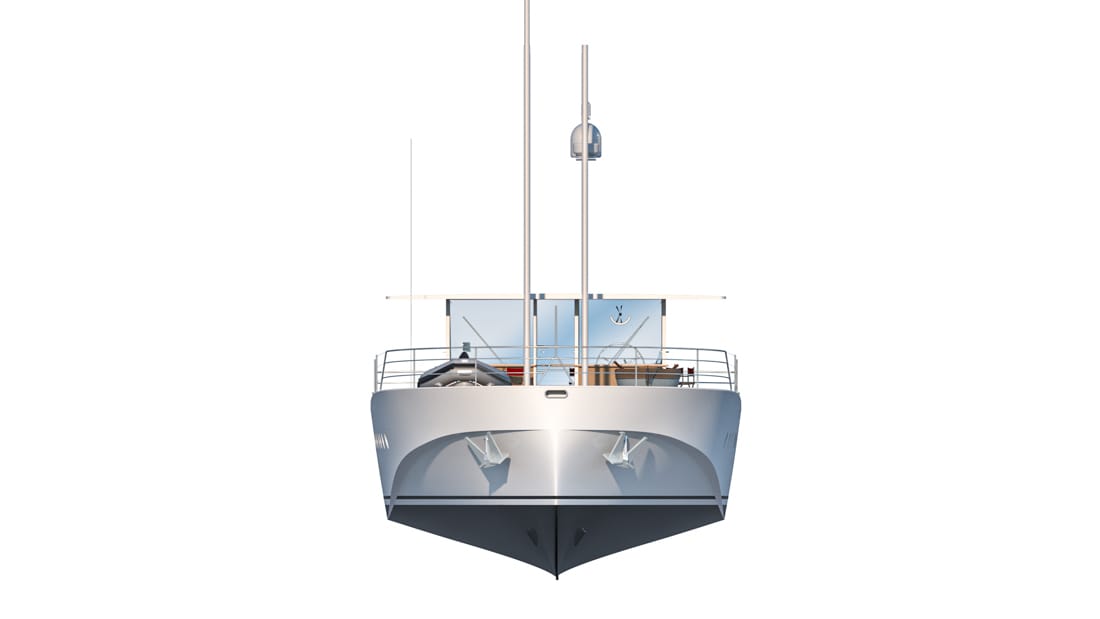
The interior layout sees the owners and two guest cabins fore with the galley, crew area and the engine room aft. The styling is understated, clean and simple while ceiling heights are generous throughout.
The saloon in the lower deck is directly connected to the coachroof via symmetrical stairs. Natural light floods in from a large skylight placed at the centre of the saloon. The floor is at the same height as the waterline so you feel as if you’re walking on water while inside the boat…
Renzo Piano and Nauta Design have years of experience sailing and are sailors at heart. Aboard Zattera they have incorporated sailboat features such as masts and derricks that will be used to load and unload the tender and to set up awnings fore and aft. While functional, these elements will also recall sailing, an approach to the rapport between Man and Nature that is close to this team’s hearts.
Main specs
L.O.A.; 23.96m
BEAM: 7.2m
DRAFT: 1.2m
Actually Nauta Design and all the parties involved will not communicate further technical data



